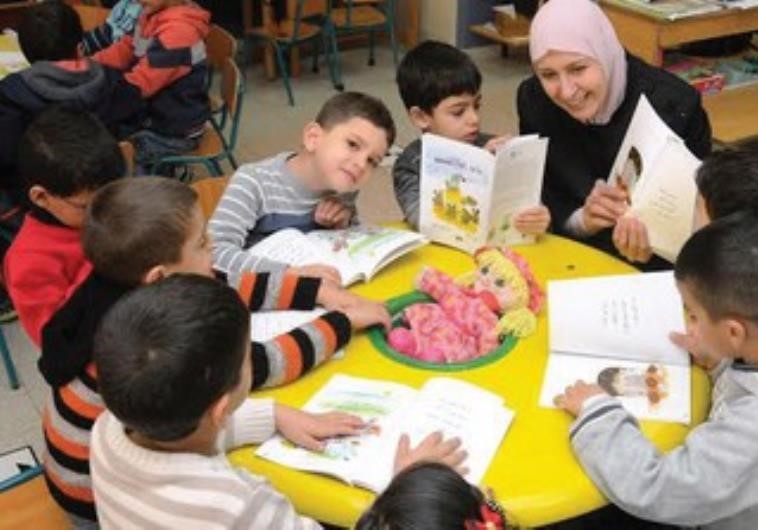
New program aims to teach love of reading to Arab kindergarten children
to print this article, click here
Initiative to provide 45,000 youngsters across country with storybooks for home.
by: Lidar Grave-Lazi
photo: A kindergarten teacher reads ‘Sumsum the Mouse’ in Baka al-Gharbiya, near Hadera. (photo credit: COURTESY MAKTABAT AL-FANOOS)
A new national program, Maktabat al-Fanoos (“Lantern Library”), encourages pre-school children in Arab communities to read.
The program, geared towards three- to five-year-olds, aims to instill a love of reading from an early age and provide children the opportunity to enjoy reading books together with their teachers and parents.
During the school year, more than 45,000 children in 1,750 kindergartens will receive four children’s books each, one per month, as a gift to bring home and read with their families. The Education Ministry is running the program in collaboration with the Massachusetts- based Harold Grinspoon Foundation and the California-based Price Family Charitable Fund.
“I am proud that as of today, Arab society in Israel can also enjoy the highest quality program to encourage children to read, and instill in them a love of books, which is key to future success in school,” Education Minister Shai Piron said.
Teachers will engage their students in fun and educational activities surrounding the books’ stories, and after exploring the books in school, children will receive copies for their home libraries. The last pages of each book will include suggestions to parents for joint activities and discussions.
“We hope to empower teachers and parents to enjoy together with children magical hours of reading, conversation and activities,” Galina Vromen, director of Israel operations for the Massachusetts-based Harold Grinspoon Foundation and director of Maktabat al-Fanoos and the Hebrew equivalent, Sifriyat Pijama, said on Tuesday.
“In the Arabic sector there a lot of homes that don’t have books, and through this program, children will receive different books so that over a period of two to three years, from pre-school and through kindergarten, they can build a nice collection,” Vromen said.
A committee of experts on education and children’s literature selected the four books. Each deals with topics closely related to the world of children and aims to stimulate discussions on universal values and to enhance the readers’ Arabic vocabulary.
The first book the children will receive, Sumsum (“Sesame”) the Mouse, tells the story of a field mouse who tends to daydream while the other mice work and gather food for the winter. When the cold finally arrives and Sumsum’s friends are bored and unhappy, the little mouse shares his colorful stories and lifts their spirits of his friends. The book allows teachers and parents to stimulate a discussion on the different kinds of personal contributions toward a joint effort.
Vromen said she has received great feedback from teachers and parents who actively participate in creative ways to encourage reading.
“One teacher said she invited parents to the school and they read the books with the children. In another class, it was a group of fathers who read the books to small groups of kids,” she said. “In the village of Arara, one teacher invited parents to the class where she had created the book in a larger size and without the words, and the children ‘read’ the story to the parents through the illustrations.”
This year the program will encompass all kindergartens and special education state schools in the Arab, Beduin and Druse communities as well as some pre-schools. Teachers will receive suggestions for creative activities surrounding the book, including integrating the stories into games, movements, discussions and artworks.
“My hope and expectation is that the program will expand next year.
This is an incredibly positive model for how a nonprofit and a government organization can work together to achieve a truly amazing program,” Vromen said.
The Maktabat al-Fanoos program is based on the Hebrew program Sifriyat Pijama (“The Pajama Library”), now operated in its fifth year at Hebrew pre-schools and kindergartens by the Harold Grinspoon Foundation in Israel in full partnership with the Education Ministry.



